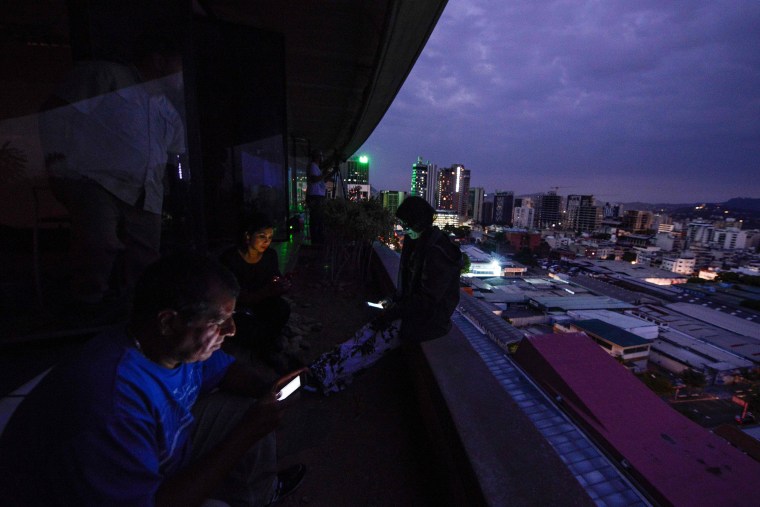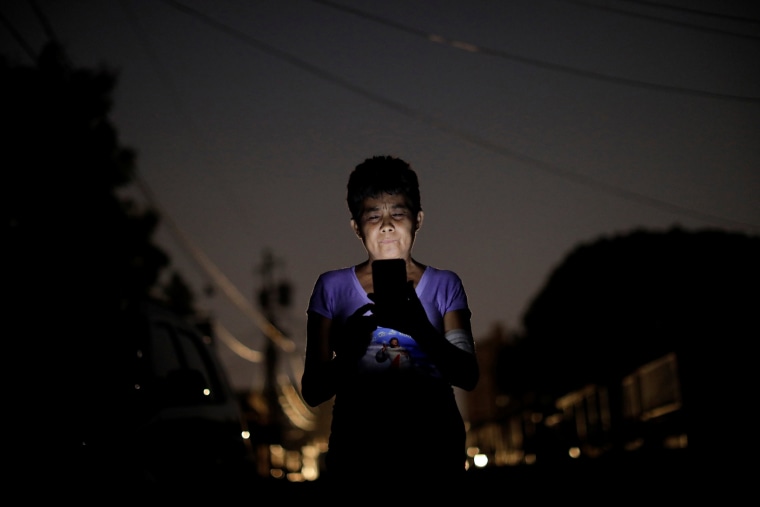CARACAS, Venezuela — Four days after first hearing about an attempted military uprising backed by Venezuela’s opposition leader, Aida Perozo was still waiting to hear details about what exactly had transpired.
Perozo, 65, a retired teacher from the city of Maracaibo in northeast Venezuela, has few sources of information. Major social media platforms such as Twitter, Instagram, YouTube, and Periscope were blocked on the day of the uprising by CANTV, Venezuela’s state-run internet and phone company, according to Venezuela Inteligente, a nongovernmental organization that defends digital rights.
CNN and the BBC, once available to those with cable television, were also pulled off the air. And decades of media repression have left the country with few independent journalists and state-run TV.
And, one top of that, the power keeps going out.
“If it were not for social media, we would not find out about anything,” Perozo said. “Since I don’t have power, in the middle of the night, I use my cellphone with the little battery life it has.”
Perozo said she wakes up every day at 3 a.m. local time to check her social media accounts and reply to messages in the encrypted messaging service WhatsApp, to which her daughter in Spain sends newscasts recorded on her smartphone. Intermittent blackouts due to government power rationing mean that Perozo often goes many hours with no power or cell service. She said she sleeps with her phone on her pillow.
Perozo, like other Venezuelans still in the country, is dealing with the government’s efforts to remain in power and quell uprisings that threaten to remove President Nicolás Maduro. The efforts have included blocking social media and mainstream internet services, messaging apps and news broadcasts.
The lack of information was most evident April 30, the day of Venezuela’s failed military uprising. That morning, Perozo received a video through WhatsApp at 4 a.m. of opposition leader Juan Guaidó speaking from a military base asking Venezuelans to take to the streets. Perozo quickly realized there was some kind of military uprising some 265 miles away, but her cellphone’s signal dropped shortly after that.
In the capital of Caracas, thousands of Venezuelans rushed to the military base to support Guaidó. But outside the capital, where there were more blackouts and weaker cellphone signals, there was little news of what was unfolding.
The information drought left many in the country with few details on the uprising. In Maracaibo, people like Perozo took to the streets. Others banged on pots outside their home windows, but had little information beyond Guaidó’s initial announcement.
The lack of information added to the challenges Guaidó often faces in reaching the masses, according to Brian Fonseca, director of Florida International University’s Institute for Public Policy.
“The government is trying to disrupt the planning and coordination among the opposition, stop the ability to inspire masses into the streets, and undermine the ability to communicate the crisis to the international community,” Fonseca said.

Venezuela’s efforts to block internet-based communication has resulted in a cat-and-mouse game between the government and its citizens. Around 2014, the walkie-talkie app Zello became popular and was often used to communicate during anti-government protests across the country until the government worked to block it. During violent anti-government protests in 2017 that left more than 100 dead, social media blackouts were circumvented by some tech-savvy Venezuelans by changing settings on their devices that allowed them to access international Domain Name System (DNS), the equivalent of an internet phonebook that connects URLs with numeric web addresses. Venezuelans also began using virtual private networks (VPNs) to access the internet.
Since 2018, many websites have been blocked by the government, leaving Venezuelans to rely on messaging apps such as WhatsApp and Telegram to stay informed.
Journalists and media companies have pushed information through the apps. One initiative, called Public Information Service, aims to inform Venezuelans by pushing one-minute audio recordings of the day’s top news through WhatsApp groups. The messages are then forwarded to others in a grassroots effort to keep people informed. News websites have also created Telegram channels to send their top stories.
Venezuela’s efforts to curtail the internet add to similar blocks by a growing number of governments around the world that have caused concern among free-speech advocates.
“Internet shutdowns are becoming more common around the world as a strategy. Usually, it’s a shutdown in narrow times of emergency,” Danny O’Brien, international director at the Electronic Frontier Foundation, said.
Sri Lanka shut down some social media sites after the Easter Day bombings that left hundreds dead. But blocking the internet is also a way of preventing opposition groups from organizing protests, though that strategy can also backfire.
“It always runs the risk of just forcing people onto the streets,” O’Brien said.
For Venezuelans, the struggle to find information has been years in the making. Under Maduro and his predecessor, Hugo Chávez, much of Venezuela’s independent press has disappeared, with more than 100 media outlets shutting down and state-run TV stations offering little coverage of protests
In the more remote Andean region of Venezuela, news is even more scant. In the municipality of Carache in Trujillo state, it has been two months since residents could watch TV because of the power outages. All they have is one state-run radio station. Their cellphone signal is intermittent.
Mileidy Andrades, 35, relies on relatives in Caracas to send her messages about what’s happening in the country, but limited information also means she has no way of separating fact from fiction. Misinformation has flourished on the app.
“When I finally get a signal, news starts arriving through WhatsApp, but we don’t know if what we see is true because there is no way to confirm,” Andrades said.
The day of the uprising, some Venezuelans celebrated what they believed to be the ouster of Maduro, only to find out later in the day that the military uprising had failed.
“That night, we saw on social media that was not the case,” she said.
